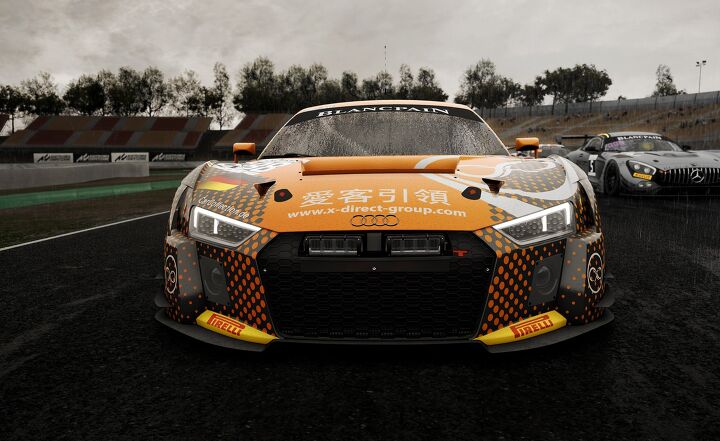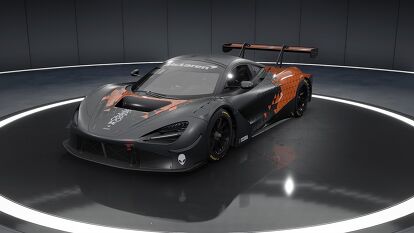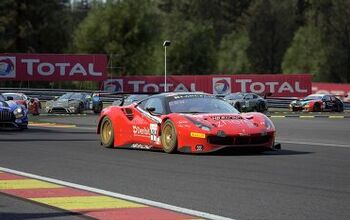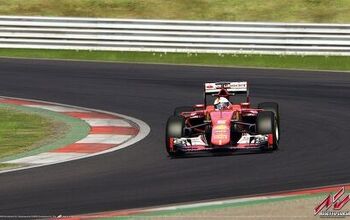Assetto Corsa Competizione Review

If you consider yourself a car enthusiast, then at one point or another, you had dreams of becoming a race car driver. Assetto Corsa Competizione is the sim racer for that dream.
Competizione—or ACC for those with terrible Italian accents like me—is the most single-minded sim racer I’ve played in years. Yes, more than the yearly F1 titles, as great as those are. This is the official game of the GT World Challenge series, and thus it features every driver, car, team and track from the 2017 and 2018 seasons. There’s no flight-of-fancy multi-hundred car garages here, nor 1000-horsepower Civics. ACC is all about the complexities of sports car racing.
That laser focus means what is here is of the highest quality. Speaking of lasers, developer Kunos Simulazioni used frickin’ laser-scanning to capture every one of the race tracks in ACC. That results in inch—no, millimeter—perfect accuracy. What’s more, the game also includes dynamic time and weather. You can race in a full 24-hour cycle at the legendary Spa-Francorchamps, and midway through be hit by a random rain storm.
Of course, the cars are the stars of any racing game, and there’s a small but impressive fleet in ACC. The big names are here: Lamborghini, Porsche, Ferrari. But the GT World Challenge includes some other goodies too, like a heavily-modified Jaguar XKR and the Nissan GT-R. These GT3-class racers all still feature recognizable road car roots, and that adds to the appeal of sending them flying around the track.
Veteran sim racers will expect this sort of attention to detail. Kunos Simulazioni crafted the original Assetto Corsa in the mid-2010s as a no-nonsense driving simulation title. It earned kudos for its accuracy, and strong community support kept the title popular for years. Don’t think of ACC as a sequel then, but more as a spin-off. We spent some time behind the wheel of the recently released console version to see if it’s worthy of the name.
SEE ALSO: Racing Simulators: Everything You Need to KnowContent and Gameplay
ACC is a tough sell in the console world of racing games. Like it or not, people are attracted to big numbers, and the two dozen or so cars and 11 tracks are a far shot from the genre leads.
As mentioned above however, Kunos Simulazioni puts so much into what is here: it’s quality over quantity, absolutely. The gang’s all here, so you can race alongside any of the names you’d recognize from the real GTWC. GT3-class racing functions under the idea of parity, where every car is balanced by the organizers to ensure close racing. Despite this, every car feels different in ACC, so you never get a been-here-done-that feeling when swapping behind different digital steering wheels.
That’s even truer with the track lineup. The 11 tracks are from the 2018 and 2019 seasons. Instead of being simple recreations of iconic ribbons of tarmac like Spa-Francorchamps and Silverstone, every one of them feels like a living, breathing monster to tame. The dynamic time and weather are tough enough: the rain forces you to re-evaluate braking points and racing lines, and night time is all claustrophobic intensity. But the bigger story here is the evolution of a track over a racing weekend. You’ll arrive to a “green” track, needing time to rubber in the racing line to really slash lap times.
A career mode offers a unique storyline through ACC’s content. You’ll start in the Lamborghini Young Driver program, in a still-fast Huracan Super Trofeo. A trio of test sessions allows the game to get a bead on your skill level, setting the various difficulty levels accordingly. Don’t worry, you can change them at will later too. Once you pass, you can sign a contract with any team and start your career proper.
There are two major issues early on, however. First, whether you’re a classic controller user or sitting in a serious sim rig, ACC doesn’t start with all the various features mapped to buttons. You’ll need to dive into the settings screen and double-check, lest you want to get flagged for exceeding the pit speed limit. The other problem is that the game doesn’t naturally explain the ins and outs of the GTWC race setup. There’s the afore-mentioned pit limiter, a pre-race, two-wide procession before the green lights, and a required mid-race pit stop during a specific time window.
Before diving into the career, perhaps run a few single races to get your feet wet. And once you’re familiar with the intricacies of the series, don’t sleep on the deep multiplayer section of the game. ACC scores players based on a variety of attributes. This means you’ll find yourself up against people of similar skill levels, ensuring close racing in either the public lobbies or the ranked races.
SEE ALSO: Top 5 Best Racing Simulator GamesPhysics and Handling
ACC builds on the deep, natural-feeling physics of the original Assetto Corsa. At launch it features almost exclusively GT3-class cars. These powerful beasts are easy to learn, but tough to master. Helping beginners out are things like ABS and traction control. You can wind back the assists however, and once you do, you’ll start peeling back the layers on each individual car’s core attitude. The big, bulky Bentley is a hard-charger and best on high-speed corners. The McLarens are darty, agile machines that can easily get away from you if you’re not careful with the throttle.
Then there’s the Porsche 911, my ride of choice for the career. It’s a safe-handling car during most situations, nice and predictable … until you trail-brake. That rear-mounted engine still respects the laws of physics, and having that mass aiming for the outside of a corner can scrub valuable grip and time. The physics engine forces you to have some mechanical sympathy for these digital race cars, constantly evolving your lap to get the most out of both the car and the track. Treat every lap like it’s a qualifying run and you’ll find a messy, unsatisfying experience.
Of course, once the skies open up things change drastically. You’ll aquaplane clear past the apex if you don’t follow the drying line. Rain cools the track—as does night time—so you’ll need to take that into account too.
ACC also allows wrench-monkeys to dive into their car’s settings to an almost obsessive level. To those not well-versed in the dark arts of suspension or differential tuning, have no fear: there are selectable presets to alter the car’s handling balance.
SEE ALSO: Top 5 Best Racing Simulator WheelsGraphics and Sound
I’ll level with you: on PlayStation 4 or Xbox One, ACC is not a great-looking game. It’s fine, but that’s all. The PC version is the visual stunner here, unrestrained by the limitations of 2013 hardware. Minor pop-up happens in the distance, and the tracks suffer from a blandness and lack of detail. On the flip-side, the visual changes wrought on the console are at least consistent, and the rain and night driving both continue to look impressive.
Avid sim racers will find the frame-rate the biggest stumbling block. It sits at a locked 30 fps, whereas most every other sim this generation uses at least 60. It results in a choppy-feeling drive, making it harder to focus on the task at hand. Driving from first-person view helps slightly; if you’re the type to use the floating third-person option, well, good luck.
Kunos Simulazioni was intent on keeping ACC’s genre-defining physics intact for console drivers. This was the trade-off. Personally, I can live with it, but if you value eye candy in your racer, there are many other titles out there that better it.
At least the audio side remains strong. ACC is a reminder of how many different sounds road cars have evolved to tune out. Of course there’s the engine noise, but there’s a heady mix of transmission whine and tire roar along with it. Find yourself in a sand trap—hey, we all do it from time to time—and you’ll hear the dirt ping off the bare metal fenders. Of course every engine sounds different as well: the high-pitched shriek of the 911 contrasts with the train-like chug of the Bentley’s turbo V8. ACC is a treat with a good set of headphones.
Verdict: Assetto Corsa Competizione Review
Assetto Corsa Competizione was never going to be a a big seller. It's too focused and too niche to be something like a Forza Horizon 4 killer. The physics are its major selling point, and on that front ACC stands above every other title out there. The game won't hold your hand through a lot of its early stages, but persevere—like an endurance race driver—and you'll find a satisfying experience. ACC makes you work for your rewards, and that makes them all the sweeter. The online racing aspect is also one of the better-realized examples in the genre, only really bettered by Gran Turismo Sport.
All we can hope for is that, with the next generation of consoles releasing later in 2020, ACC is optimized to take advantage of their extra horsepower. As it stands, the console versions aren't the prettiest racers out there—but then again, that's never been the point of race cars, right?
Assetto Corsa Competizione is without equal on the physics front. It's not a sequel to the lauded original—it's a laser-focused spin-off. That might limit its appeal, but there's something refreshing about the singular focus here, and how satisfying it feels to improve at it. The hardest sell for ACC is its last-gen graphics, but look past those and you'll find a deep, satisfying racer.
We are committed to finding, researching, and recommending the best products. We earn commissions from purchases you make using the retail links in our product reviews. Learn more about how this works.
Pros | Unbeaten physics simulation / Superb car and track recreation / Dynamic time and weather |
Cons | 30 fps, middling graphics / GT3 only (at launch) / Not enough race information |
Bottom Line | If you want to live the digital race driver life, this is the pick of the class |

Kyle began his automotive obsession before he even started school, courtesy of a remote control Porsche and various LEGO sets. He later studied advertising and graphic design at Humber College, which led him to writing about cars (both real and digital). He is now a proud member of the Automobile Journalists Association of Canada (AJAC), where he was the Journalist of the Year runner-up for 2021.
More by Kyle Patrick





































Comments
Join the conversation